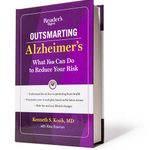6 of the Best Brain-Boosting Activities With Science on Their Side
Updated: Apr. 21, 2016
How you spend your leisure time can play a powerful role in protecting your brain from dementia and Alzheimer’s disease. From learning a new language to taking art classes, these activities can help keep your mind sharp for life, studies show.
When you want to work out your body, you go to the gym. What do you do to give your brain a workout? Get lost in an unfamiliar city, help your grandchildren with their homework, upgrade your computer’s operating system, or see if you can put together an entertainment center from IKEA. Such activities force us to slow down and pay close attention to what we are doing. We must read and follow directions as well as absorb and understand new material. The unfamiliar can make us feel uncomfortable, but the more we challenge our brains, the healthier they remain.
[pullquote]Without a regular dose of challenging situations, our brains get flabby, in much the same way our bodies get flabby when we don’t challenge our muscles with enough exercise. [/pullquote]
In one study, older adults who frequently took part in stimulating leisure activities such as reading, board games, playing musical instruments, and dancing were less likely to develop dementia over 21 years, compared to older adults who participated less frequently in these activities over the same time period, and several other studies have yielded similar findings.
Exactly why intellectual challenges bolster brain health is a matter of debate. According to one theory, intellectual hobbies create a cognitive reserve in the brain. A cognitive reserve is a lot like a large bank of knowledge. For example, let’s say that, around age 40, you made a New Year’s resolution to learn one new vocabulary word a day. According to this hypothetical example, let’s say your brain holds the memories of well over 20,000 words. On the other hand, maybe you have a twin brother named Paul, who spent the second half of his life feeding his brain reality television. As a result, he knows fewer than 15,000 different words—not that he’s counted.
According to our story, plaques and tangles begin to form in your brain at the same rate they begin to form in Paul’s. In other words, if we put you both in an fMRI scanner and peered inside your brains, your brains would appear to have roughly the same number of plaques and tangles. Yet you have no symptoms, whereas Paul is often at a loss for words. That’s because Paul knew fewer words to begin with. So when your brain lost track of the word, say, grouchy, it would have many other words—irritable, bad-tempered, cantankerous, petulant, surly, testy, snappy—to draw from.
[pullquote] In other words: The less you know, the less you can afford to lose. The more you know, the more you can afford to lose. [/pullquote]
But cognitive reserve may not be the only explanation for the protective power of intellectual challenges. These pursuits may actually encourage the growth of new brain cells and connections between those cells. The hippocampus is one of the only areas of the brain that can grow new neurons. Even during old age, this area of the brain contains residual stem cells capable of birthing new neurons.
When you crawl into bed tonight, you will no longer be the same person— neurologically speaking—as you were when you woke. That’s because the brain is continually reorganizing itself. Every new experience and challenge nudges the brain to make new cell-to-cell connections.
The following “prescriptions” will help you challenge your brain and may help to lower your risk of dementia and Alzheimer’s disease.
1. Take acting classes
Acting requires lots of memorization. According to one study, 122 seniors who took twice-weekly acting lessons for four weeks improved their ability to memorize and recall a list of words, remember a series of numbers, read and remember a short story, as well as their performance on many other tests of memory, whereas seniors who didn’t take acting lessons did not boost their performance on these tests. In a follow-up study done by the same researchers, the seniors who took acting classes improved their word recall by 19 percent and word fluency by 12 percent.
2. Become a tutor
Women who volunteered 15 hours each week for Experience Corps, a program that pairs senior citizen reading tutors with children who are developing their literacy and problem-solving skills, experienced increased activity in brain regions associated with attention. In addition to Experience Corps, look into Laubach Literacy International, Oasis, and various local programs coordinated through the public school system or your local library.
3. Try puzzles and board games
Older adults who regularly played board games and puzzles during their leisure time were more likely to preserve brain tissue and maintain memory and other cognitive functions compared to people who didn’t play games, according to a study of 329 people. The results even held true for people who were genetically predisposed to developing Alzheimer’s disease. Choose games that you enjoy and feel challenged to play. In the study, checkers, crosswords, and card games were all effective. You can even pull out those board games from childhood.
4. Learn to play an instrument
This forces you to sharpen many different cognitive processes, including attention, memory, motor skills, auditory skills, and visual skills. It’s no wonder studies have found that playing a musical instrument delays the onset of cognitive decline. When researchers from Emory University tested the cognitive health of 70 older adults, they found that study participants with at least 10 years of musical experience performed better on tests of nonverbal memory, naming, and many other cognitive processes than older adults with less training or no training at all.
Or in lieu of playing an instrument, you might also benefit from singing in a choir. In one study, older adults who joined a singing group improved their memory and attention.
It’s never too late. Just because you didn’t learn an instrument or train your voice when you were a child doesn’t mean you can’t learn now. In addition to helping keep your brain sharp, music lessons may also allow you to maintain fine motor skills. When researchers offered piano lessons to older adults, the study participants were able to improve cognitive abilities—including attention, concentration, and planning—over just six months, compared to study participants who didn’t take lessons.
5. Draw, paint, or sculpt
Artistic pursuits such as painting encourage you to focus your attention. In order to draw a flower, for example, you have to look closely at a real flower or a picture of one—and pay particular attention to the shape of the petals, stem, and leaves. As you draw, you’re also making dozens of spatial calculations. For example, how large should the petals be if you want to make sure there’s enough space at the bottom of your picture to draw some grass or, in the corner of your picture, to draw a bumblebee?
Seniors who took up painting, drawing, or sculpting were 73 percent less likely to develop mild cognitive impairment over a period of four years than were people who did not engage in these types of artistic activities, found a recent study of 256 octogenarians by researchers at the Mayo Clinic. Crafting activities—such as woodworking, pottery, ceramics, and quilting—were also beneficial, reducing the likelihood of MCI by 55 percent.
You might see yourself as someone who “isn’t artistic” or who “can’t draw,” but that may only be because no one has taught you how. If you take lessons and practice what you learned, you may surprise yourself.
6. Learn a new language
When researchers assessed the backgrounds of patients with Alzheimer’s disease, they found that patients who were bilingual—fluent in at least two languages— had developed Alzheimer’s disease an average of 4.6 years later than patients who spoke only one language. Just because you didn’t learn a second language while you were in grade school doesn’t mean you can’t learn one now.
 Protect your brain from dementia and stay sharp for life with the 75-plus tips in Outsmarting Alzheimer’s by Kenneth S. Kosik, MD. Learn more and buy the book here.
Protect your brain from dementia and stay sharp for life with the 75-plus tips in Outsmarting Alzheimer’s by Kenneth S. Kosik, MD. Learn more and buy the book here.
















